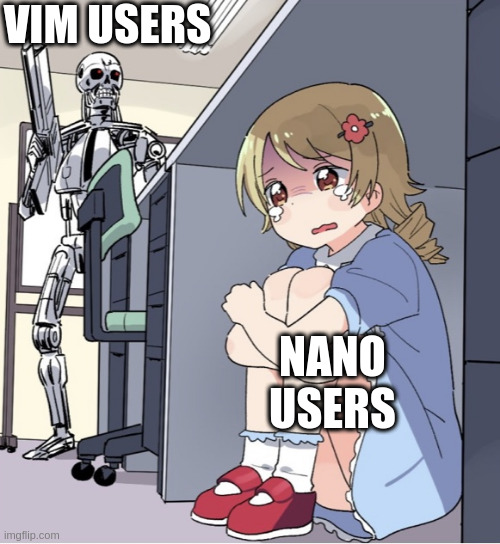this post was submitted on 02 Sep 2024
386 points (93.3% liked)
Linux
48927 readers
1196 users here now
From Wikipedia, the free encyclopedia
Linux is a family of open source Unix-like operating systems based on the Linux kernel, an operating system kernel first released on September 17, 1991 by Linus Torvalds. Linux is typically packaged in a Linux distribution (or distro for short).
Distributions include the Linux kernel and supporting system software and libraries, many of which are provided by the GNU Project. Many Linux distributions use the word "Linux" in their name, but the Free Software Foundation uses the name GNU/Linux to emphasize the importance of GNU software, causing some controversy.
Rules
- Posts must be relevant to operating systems running the Linux kernel. GNU/Linux or otherwise.
- No misinformation
- No NSFW content
- No hate speech, bigotry, etc
Related Communities
Community icon by Alpár-Etele Méder, licensed under CC BY 3.0
founded 5 years ago
MODERATORS
you are viewing a single comment's thread
view the rest of the comments
view the rest of the comments

Stockholm Syndrome was never real, it was made up to explain a situation where hostages recognized an injustice and refused to perpetuate it, so cops called them crazy. So sure, if you call me crazy for my affection for a tool that has served me well for decades, I’ll consider you a cop.
Okay... because you refuse to actually look at whether there are better options than the absolute trash you are using because you are used to it
I've used other options and carefully elaborated them all, vim remained a superior tool.
Because you're used to it. No other reason
What’s the superior choice to vim, then?
Literally anything up to and including poking yourself in the eyes and trying to develop laser vision to manually modify bits on the disk platter
See, you’ve realized your blunder, now. Tell us what editor you use in the terminal, ReCursing, the one that is better than vim. We’d love to know.
If I am forced to use an editor in the terminal, nano generally. But I very rarely need to because I have a functioning modern computer from within the last 25 years and therefore have a gui I can rely on. If I somehow manage to break the gui in a way that requires me to edit a text file (itself very very rare) I can fix it with nano.
Now, why would you voluntarily use an editor with a ui that's needlessly confusing and convoluted, an arse to learn, and notoriously difficult to even save a file and close without checking help files if you haven't already memorised completely random key combinations? I would say we'd love to know, but we already do. It's because you're an arrogant dickwad - at least that's what your last comment makes you look like
It’s because my job involves managing and operating systems that are only accessible through ssh or tty sessions. I spend hours every day in a terminal, on a remote session, frequently editing files for stuff: crontabs, configs, etc.
I learned vi because when I was coming up, university systems only had ed, vi and emacs, with pico on the servers that had pine for email. I learned vi because it was more powerful than pico (and because I couldn’t get the hang of emacs key combos). I read the help files and learned how to use it, because it was foundational.
Every Unix-like system has a variant of vi. Many of my container images don’t, but it’s trivial to install and use anywhere if needed.
It’s just a more powerful tool than nano, and consequently more difficult to use. Which is fine, man. It’s okay for you to use a basic text editor on the rare occasion you have to edit something in a terminal. You don’t have cause to learn how to be productive in an advanced editor, and that’s fine.
For what it’s worth, when I’m writing and testing python, I use VS Code.
It's more powerful than nano, sure, but it's also needlessly more complex a ui. Your use case is legit and that you know vi is a reason to continue using it, but it absolutely should not ever be the default for anything any more!